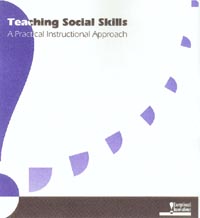|
Finally,
a sound yet easy-to-use approach for helping students develop
critical social skills. With the Teaching Social Skills program,
you move beyond a cookbook approach to remediation and make a
lasting difference in your students. Unlike other social skills
programs that require you to make major changes in your curriculum
and instruction, this program is easily infused into your daily
instructional routines.
The manual explains the instructional strategies
and offers practical advice on applying the approach to children
with difficult behaviors. The social skills selected for inclusion
in the program--for example, accepting consequences, listening,
following directions, coping with conflict, accepting responsibility
for one’s behavior, making friends--were identified by over
1,000 teachers as being the most needed.
Table of Contents
Introduction
The Teaching
Social Skills Program 1
Program Structure 1
Teaching Social Skills 3
Conclusion 9
References 9
The Teaching Social Skills Model 10
Saying
Please and Thank You
Student: Withdrawn 11
Student: Immature 13
Student: Aggressive 15
Dealing with
Fear Appropriately
Student: Withdrawn 17
Student: Immature 19
Student: Aggressive 21
Dealing
with Anger Appropriately
Student: Withdrawn 23
Student: Immature 25
Student: Aggressive 27
Rewarding
Oneself
Student: Withdrawn 29
Student: Immature 31
Student: Aggressive 33
Asking Questions
Student: Withdrawn 35
Student: Immature 37
Student: Aggressive 39
Accepting
Consequences of Behavior
Student: Withdrawn 41
Student: Immature 43
Student: Aggressive 45
Successfully
Coping with Conflict
Student: Withdrawn 47
Student: Immature 49
Student: Aggressive 51
Accepting
Responsibility for Behavior
Student: Withdrawn 53
Student: Immature 56
Student: Aggressive 59
Listening
Student: Withdrawn 61
Student: Immature 63
Student: Aggressive 65
Successfully
Dealing With Losing
Student: Withdrawn 67
Student: Immature 69
Student: Aggressive 71
Responding
to Failure
Student: Withdrawn 73
Student: Immature 75
Student: Aggressive 77
Successfully
Dealing with Mistakes
Student: Withdrawn 81
Student: Immature 83
Student: Aggressive 86
Building
a Positive Self Attitude
Student: Withdrawn 89
Student: Immature 91
Student: Aggressive 93
Following
Directions
Student: Withdrawn 95
Student: Immature 97
Student: Aggressive 99
Making Friends
Student: Withdrawn 103
Student: Immature 105
Student: Aggressive 108
Understanding
Others’ Feelings
Student: Withdrawn 111
Student: Immature 114
Student: Aggressive 117
Compromising with Peers
Student: Withdrawn 121
Student: Immature 124
Student: Aggressive 127
Coping
with Aggression From Others
Student: Withdrawn 131
Student: Immature 133
Student: Aggressive 136
Cooperating
with Peers
Student: Withdrawn 139
Student: Immature 141
Student: Aggressive 144
Accepting
Not Getting One’s Own Way
Student: Withdrawn 147
Student: Immature 150
Student: Aggressive 152
Seeking
Attention Appropriately
Student: Withdrawn 155
Student: Immature 158
Student: Aggressive 161
Waiting
One’s Turn
Student: Withdrawn 165
Student: Immature 167
Student: Aggressive 169
Accepting
the Answer "No"
Student: Withdrawn 173
Student: Immature 176
Student: Aggressive 178
Appendix:
Record Card Masters
 Read excerpts of this publication in PDF: Read excerpts of this publication in PDF:
> Accepting Consequences of Behavior
> Listening
|  Teaching Social Skills
Teaching Social Skills
 Read excerpts of this publication in PDF:
Read excerpts of this publication in PDF: